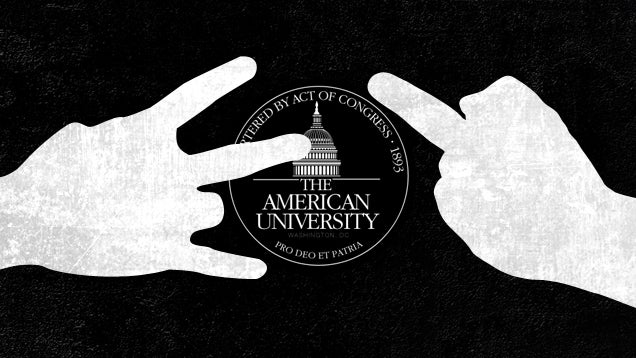
On April 7th, an American University undergrad named Alex Louden was assaulted while walking near campus. His assailants allegedly first ran him down with a car, and then beat him while yelling anti-gay slurs until Loudon began to fall unconscious. He was hospitalized with a severe concussion and a spinal strain. Two of Louden's three alleged assailants were members of Epsilon Iota, an illegal, "secret" frat that has operated with impunity on American University's campus for over a decade. It's the same fraternity that in recent days was the subject of an anonymous "leak" of incriminating, rapey emails.
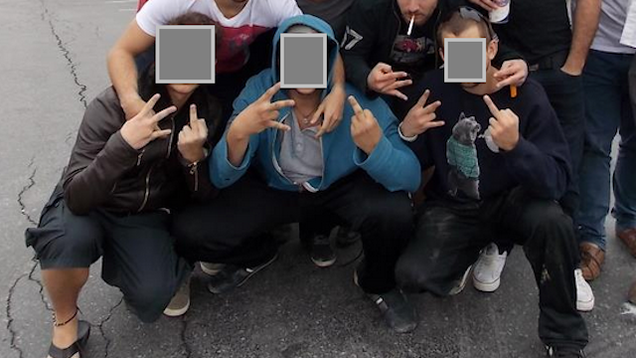
According to student newspaper The Eagle, Louden may have fallen into Epsilon Iota's bad graces after beginning the process of pledging his freshman year only to withdraw himself from consideration and instead join a "rival" frat. After that transgression, Louden says he was harassed and intimidated by EI members, who regularly referred to him using hissed anti-gay slurs. Things came to a violent head in early April, when EI members Milain Fayulu and Anthony Abdelnour, along with non-EI member Miguel Lama allegedly spotted Louden walking home from class. And then,
The three men allegedly attempted to run Louden over with a car as he passed the Nebraska parking lot while walking home after class. They exited the car and yelled at Louden, who said he yelled back and then left, continuing to walk down New Mexico Ave., away from campus.The car then appeared to drive in the opposite direction, but abruptly turned to follow Louden, he said. The three assailants then exited the car and kicked him in the head 20 to 30 times, according to the incident report obtained from the Metropolitan Police Department."They spat in my face. They were yelling, 'We're gonna kill you, you [anti-gay slur]. You f***ing bitch, you're dead…We'll put you in the hospital. We'll f***ing kill you.' Just stuff like that, the whole time," Louden said.
All three alleged assailants were arrested on April 11th and are currently facing disciplinary action from the University.
A casual observer might wonder what the hell is going on at American University. Why is an "illegal" frat with a documented history of violence, illegal activity, and a culture that encourages rapey behavior allowed to operate with impunity? How much does the University know about Epsilon Iota's activities? And is anything at all being done to stop it?
Epsilon Iota is a nonfrat (or fauxternity, if you will) that came into existence as the result of the sort of liability dodgeball Universities like to play with alcohol and Greeks. In the early 1990's, American University kicked its fraternities and sororities off campus and became "dry." Greeks were still allowed to exist; they just had to do whatever it was they were going to do off campus. As a result, the Bacchanalian partying that has come to characterize a particularly embarrassing phase of young adulthood moved from AU's campus to the surrounding neighborhoods. Local residents were less than thrilled.
In 2001, after a few pledges to AU's Alpha Tao Omega chapter had to be hospitalized with alcohol poisoning that resulted from hazing, the national chapter revoked the charter of its AU branch, leaving the brothers of Alpha Tao Omega's Epsilon Iota chapter sans national affiliation. In the words of a former AU student, "AU had a rogue chapter on its hands."
But, thanks to its "dry" campus that pushed Greeks into the surrounding neighborhoods and away from University control, there was little American could do to keep EI from doing pretty much everything that all of the other fraternities were doing. And it seems that, for years, American has turned a blind eye to EI despite the fact that their existence and the identity of its members is an "open secret" on campus. And on social media, where as of Wednesday, two days after we initially ran the damning emails, several current and former members of the EI whose names were mentioned in the emails still had publicly perusable Facebook profiles.
American University's campus is in Washington DC, which generally has good transportation infrastructure. But frat houses aren't concentrated in the neighborhoods immediately surrounding American; they're in more far-flung neighborhoods as far from campus as across the edge of the District, in Maryland. Girls can't exactly meander down frat row from party to party; socializing takes trip planning and ride coordinating. To combat the problem of logistics, on Friday and Saturday nights, parking garages on and around campus become de facto transportation hubs for cars driven by frat guys of questionable sobriety hauling dolled up freshman girls by the carload from campus to their off-campus houses. Courtney* a current AU freshman, told me that this is how things usually go:
You line up in the parking garage, they pick who they want in their cars (based on looks), you pile in (six people in the backseat is not uncommon) and they bring you to the party and back to campus later (or if you can't get a ride back, you take a cab). This is true for all AU frats including EI.
While frats at AU have utilized the parking garage meat market system for years, the difference between "sanctioned" frats at AU and the "secret" frat EI is that EI isn't beholden to a national fraternity, or even to a spot on the university's Greek Council. As soon as they lost their charter, the group was freed from the rules that governed the other frats. They could recruit new pledges whenever they wanted instead of waiting until the spring semester like everyone else. They could avoid paying sky-high insurance fees and instead spend all of their money on booze and parties and, I don't know, big light up beer signs for their living room.
At the same time, EI continued to operate just like a sanctioned frat, lining up their cars in the same parking garage line as their legitimate counterparts, recruiting pledges, mixing with sororities (even though, according to one recent AU graduate who was involved in the Interfraternity Council, most sororities strongly discouraged their members from participating in EI activities). Epsilon Iota bros even have a super secret hand signal that is so super secret that a bunch of them were doing them in tagged, public Facebook photos.
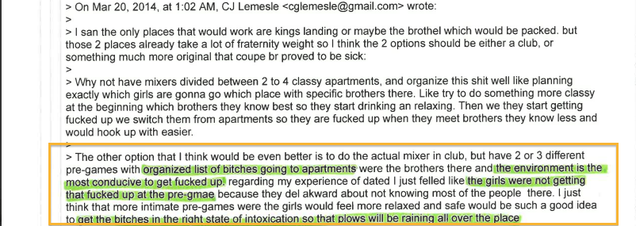
It didn't take long before super secret-but-not-actually-at-all-secret fraternity EI had a bad reputation. And I don't mean "cool;" I mean like "destructive, predatory, and rapey." One AU student who was a freshman in 2002 recalls that even then the frat was a haven for party creeps. A current AU sophomore told me that within the first couple weeks of her freshman year, she'd been warned against attending EI parties, older students had warned her that girls get drugged and raped there. A young woman in her freshman year at American told me a similar story, that she was told upon her arrival on campus that EI parties are bad news for girls who don't want to get drugged and raped. Another AU student said she was told not to dip into EI parties' free-flowing supply of "jungle juice," because, rumor had it, the brothers lace it with roofies. Another avoids the frat entirely, terrified that if she ever stepped foot in their off campus house, she'd be assaulted.
There is no "typical" EI member. An alum who graduated in the mid-2000's recalls that when he was there, EI was a place that seemed to attract less privileged men than the other frats, men who picked up freshman girls from parking garages in several-year-old BMW's rather than brand new ones. But current students tell me that in recent years, EI has earned the dubious reputation of being a place that attracts "foreign, rich, wild partier[s]." They've even got their own closely affiliated club promotion company called Pretty Boy Promotions, sources on campus tell me. According to the company's Facebook page, Pretty Boy is "the foremost nightlife events production, and promotions [sic] company in the Washington Metropolitan Area," great for parties that are "catered for [again, sic] young professionals in both the 21+ and 18+ demographic."Imagine a joint venture between Tom Haverford and Jean-Ralphio fromParks & Rec, minus the likability imparted by the comedy writers behind their most memorable lines, and you get the idea. At one point, the user pic for Pretty Boy Promotions was a head shot of Gian Varela, a DJ and former EI member whose name appears in the cache of gross emails leaked to the media last week.
Being a douchebag isn't a crime. Being a rapist is. From the language tossed around in the cache of leaked emails, its clear EI brothers at least talked big game about using alcohol to incapacitate women pre hookup.
In fact, the 70+ pages of EI's leaked emails reflect a bizarre obsession with getting girls drunk and then having sex with them, or what the law and American University would classify as "date rape**." But when I asked several current and former AU students whether they knew anyone personally who had been sexually assaulted by members of EI while under the influence of drugs or alcohol, only one person answered in the affirmative, a freshman girl whose dorm mate had returned from an EI party wasted and saying she'd been sexually assaulted on the dance floor last fall.
One would think that an organization would actively fight a "club of criminal douchebags" reputation and work to expel members that were a liability to their reputation, especially if what they really wanted was to be accepted back into mainstream Greek life. And, in public at least, EI members attempted to establish themselves as upstanding members of the student body, as seen by this letter to the editor of campus newspaper The Eagle from 2006,
In the September 28, 2006 edition of The Eagle it was reported that, according to an attributed source, the organization Epsilon Iota "does not follow any sort of by-laws and engages in questionable behavior such as hazing and excessive drinking."As the President of Epsilon Iota, it is not only my duty to know the by-laws of the organization, but to enforce them with the rest of my Executive Board.The university administration has clearly not put in the time or effort to examine the reasons why Epsilon Iota is so strong and so resilient. One of the primary reasons is because we have, contrary to popular belief, a set of rules and principles that govern the behavior of our organization.In the fall of 2003, judicial cases were brought against the individual members of Epsilon Iota in an attempt to expose them as Alpha Tau Omega "rip-offs." At this the administration was unsuccessful. Instead, the legitimacy and right of Epsilon Iota to exist within the Washington, D.C., community was established.In the past, members of Epsilon Iota have interned at the White House and Capitol Hill, served our country in Iraq and been elected to the university's student Senate. In addition to being students and friends, we are all part of an unrecognized, social organization. Our brothers do not lie about and are not ashamed of this fact. We have waited years for the administration at American University to do the same.We are still waiting.
One member of EI spoke anonymously to American's student newspaper in the wake of the email leaks and said that the fauxternity has its own set of rules, and as an organization condemns sexual assault.
But, judging by private conversations, it's clear that what goes on in private when EI brothers think no one is listening is much different than what EI brothers tell the public. Emails released in the cache remind fraternity members, over and over again, that their power is in their anonymity and mystique.
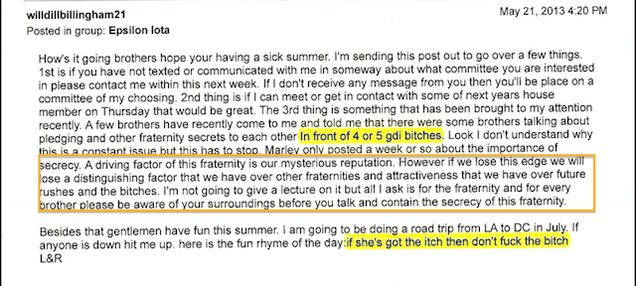
In one "state of the frat" style email from December 2012, Epsilon Iota member Philemon Dawit warned listserv members "DON'T RELEASE FRATERNITY INFORMATION TO FUCKING RUSHES OR I WILL HUNT YOU DOWN. We are the best thing to ever happen to this campus and always act like it. No one is better than you so don't act like it."
In fact, after talking to several members of the AU community, it seems the rumored "date rape" fraternity at AU is actually much better at property destruction, drug dealing, and assault than they are at documented sex crimes. One former AU student who graduated in the mid-2000's would buy drugs from the EI house, until his drug dealer was arrested. Emails traded by the brothers show the fauxternity members regularly engaging in the drug trade with each other.
They weren't great neighbors, either. Here's student newspaper The Eagle in fall 2010:
Last year, of the 27 total neighbor complaints, 15 were filed by the same residence, Hradsky said. The house at the source of the alleged misconduct has since been sold and the new owner will probably not rent it to students, Hradsky said.The house had previously been rented by members of Epsilon Iota, the remnants of a fraternity barred from AU due to misconduct. According to neighbor complaints, there were continuous instances of loud parties, public urination and trash. Members of EI have refuted these claims.
When Alex Louden was assaulted on April 7th, students tell me they were unsurprised that his alleged assailants were Epsilon Iotas. In fact, one of the men implicated in the assault was implicated in another assault on campus alluded to in the leaked emails. By the alleged assailant himself.
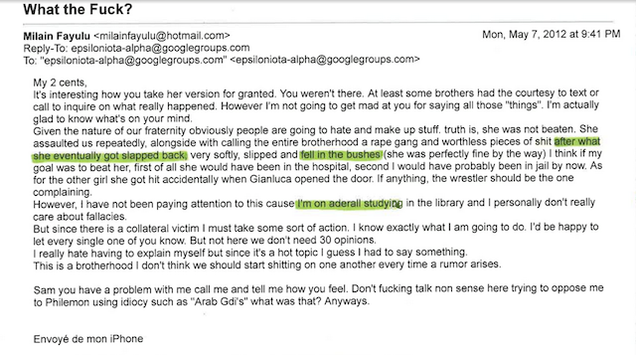
Students at AU tell me that many on campus knew about Louden's assault, but were afraid to post anything on social media or speak to anyone on the record out of fear they would also face possibly violent repercussions from EI brothers. The day after the April 7th assault, the University did not issue a statement. Nor did they issue a statement on April 11th, when the students allegedly responsible were arrested.
American University, for its part, hasn't done much to combat the existence of EI as a threat to campus safety, but they do have a long history of saying they care deeply about fighting EI and promoting campus safety.
In 2006, the Interfraternity Council passed a resolution barring recognized fraternities and sororities from formally interacting with EI and the campus's other unsanctioned frat at official Greek events. That year, the Office of the Dean of Students hired a federal prosecutor to look into how to remove EI's lamprey-like presence from AU's campus, but ultimately, nothing happened. In 2010, the University expanded its code of conduct to include the ability to discipline students for off campus misconduct. EI continued on. When I reached out to the University for comment on the current fracas, I was sent an excerpt from a statement issued by the President of the University on the 24th, which read:
We apply our student code of conduct and local and federal laws. An intense investigation is underway and will determine instances where evidence will support adjudication on campus or in coordination with law enforcement agencies. We are determined to respect the time it takes to complete the process and avoid jeopardizing our ability to hold individuals accountable.
Reports are incorrect that the university has done nothing to curtail the activities of the group of individuals that pose as a "brotherhood" and mask themselves in the rituals and social benefits of a fraternity, but uphold none of the traditions of scholarship, leadership, and service. The university started by deploying all of the tools it has available to hold a group accountable. The details of the university's 2001 sanctions and withdrawal of the group's recognition are well known and outlined on our website and in mass mailings. For years, the university has warned students to avoid joining or engaging with this group and also warned parents in orientations and in writing.
Whenever credible reports about misconduct have been provided, we have pursued them.
It's not clear whether the email leak and the attack on Alex Louden are related (although the timing of the leaks is certainly interesting in light of the assault allegations), but from conversing with current and former AU students, it's clear that students had come to expect dangerous behavior from EI brothers and zero response from the administration. And it's unsurprising that frustrated (and still somewhat terrified) students are taking matters into their own hands.
The email leak, which originally went out to AU students and staff, was engineered by someone who called themselves "Worthy Keeper" and promised that they had in their possession three times as many emails as the 70+ leaked pages as well as current and former frat members and victims of frat members who were willing to go on camera to discuss the story. Worthy Keeper's email address has since been deleted, and the identity of the person who retrieved the emails from the listserv remains secret.
Also deleted is a tumblr called Protect AU Women, which published the unredacted names of the EI members in the leaked emails. Another deleted Tumblr, DontHireEI, published the names and workplaces of several members behind the egregious EI emails. A third Tumblr, The Fratergate AU, continues to publish news as it happens, including anonymously submitted accounts from women who say they were sexually assaulted at the EI house.

A group of AU students that calls itself No More Silence has banded together to pressure the University to act more decisively. Apetition demanding, among other things, that AU expel all of the members of EI who participated in the email threads, has garnered more than 1,700 signatures. An AU student involved in the group tells me that yesterday, several dozen students marched to University President Neil Kerwin's house in hopes of spurring action from the administration. They were greeted outside of the Preisdent's house not by Kerwin himself, but by an underling. Clearly, Kerwin had better things to attend to. The corresponding Facebook group, public earlier this week, has made its membership list private, ostensibly due to safety concerns facing members.
But would expelling EI members even do anything to combat a problem that, by all accounts, is already endemic to campus culture? Because making shitty rape jokes isn't against the law and, many of the individuals active on the email listserv have already graduated, it's not clear what, if anything, expelling current EI members would accomplish. Sources on campus tell me that after EI's emails leaked, at least two fraternities immediately deleted their respective list servs in a panic. Were they protecting themselves from being exposed as cute bunny gif enthusiasts? Or were they protecting themselves from being exposed as the same sort of knuckle draggers that populated EI?
Let's not pretend that sloppy, obnoxious, destructive, occasionally violent conduct with a "get girls drunk so we can make them do sex things with us!" ethos hasn't been the behavior model for a depressing number of fraternities (or homosocial groups of college men) since, uh, forever. While the language used by the brothers of EI is disturbing and fucked up, they're by no means the originators of that sort of language. Not one (epsilon) iota of me thinks they're smart enough to come up with this shit on their own. Another AU alum told me that while EI was the worst, their behavior and attitude toward women was something he saw as typical to fraternities at his alma mater.
Carter Gibson a recent AU grad who Vice President of the Inter-Fraternity Council for three years, insists that while there are always "bad" fraternities, AU's Greek system encourages community responsibility and provides training to members. Sanctioned Greeks at AU are beholden to something — the national chapter of their respective fraternities and sororities, the school administration, a national network of alumni — and EI's neanderthalish behavior is far, far worse than anything he saw in his frat.
I wasn't always thrilled with what my own fraternity had to say, but it A) wasn'tnearly as bad as EI's and B) it was never awful. Sadly, some fraternities at AU do say awful things on the listserv that can, at the very least, hurt feelings, but when there are severe consequences for off-campus drinking / partying for recognized organizations, I can understand why they would delete their emails. The fact of the matter is that they can get in trouble for small infractions that are a normal part of the college experience.
Whether or not EI's culture was something that existed in other frats on AU's campus, none of the other frats have inspired the vitriol that EI has among AU students and alumni. By turning a blind eye or making empty threats to EI over the years, American has only contributed to EI's "mystique," which has given members an inflated and undeserved sense of power and status. And that inflated sense of power and status has fostered what many students say is an unsafe environment. Just ask Alex Louden, who still suffers panic attacks in the weeks after his assault.
American isn't the only school with a "secret frat" problem. Wesleyan's Beta Theta Pi fraternity lost official recognition after refusing to admit female pledges but continued to operate sans University oversight. In the aftermath, the house earned the nickname "Rape Factory" and iscurrently at the center of a lawsuit filed by a woman who alleges she was raped in its common room. When Universities fail to protect their students, the glossiest of admissions brochures can't speak louder than the ensuing bad press.
When I lived in Chicago, my apartment was down the street from a house that contained a non-legally-recognized group of young men whose raison d'être was to sell drugs and party, had a special hand signal and matching tee shirts, and who occasionally were known to damage property or assault people. Only in Chicago, we called that group a "street gang."
*names have been changed unless otherwise noted
***According to the definition of "consent" used by the law and by American University, women who are incapacitated by alcohol are incapable of giving consent. Sex without consent is rape. Not that tough a concept to master.

No comments:
Post a Comment